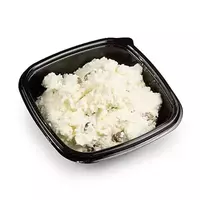Children's cottage cheese

Children's cottage cheese refers to those rare products-exceptions that can be purchased in the store, i. e. ready-made. The thing is that not always the taste of homemade children's cottage cheese will be to the taste of your baby. Moreover, at present, on the shelves of domestic stores, you can easily find a large selection of children's curds for every taste. Children's cottage cheese differs in all respects from ordinary cottage cheese. First, the consistency of the baby curd is close to a product such as yogurt.
Secondly, the level of acidity of children's curd is significantly lower than the indicators of a regular sour-dairy product. It is believed that it is necessary to introduce children's cottage cheese into the baby's diet from the age of 6-8 months. Pediatricians have set a norm of 40 grams of children's cottage cheese per day for children aged one and over. It is worth noting that children's curds are considered an excellent source of calcium. When choosing this product for your child, you should pay attention primarily to the product label.
The product should be called children's cottage cheese or cottage cheese and in no way else. In addition, on high-quality and safe products for the health of babies, including on the children's cottage cheese, there should be advisory information indicating the age from which the product can be eaten. In addition, the label of the children's curd should contain the composition of the product. In addition, it is worth paying increased attention to the chemical composition of the product, which should contain a thermized curd mass, and not just cottage cheese.
Since the stomach of young children is strikingly different from the stomach of an adult, children's products are prepared with special ingredients. Therefore, children's curds are made exclusively from fermented milk products that have been heat treated after fermentation. Often, children's curds contain food additives or fruit and berry, as well as fruit filler, which makes the taste of the product more attractive.
Unfortunately, not all food additives used in the production of baby cottage cheese benefit the baby. To prevent the harmful effects of various dietary supplements on the child's body, pediatricians advise completely eliminating foods containing unsafe compounds from the child's diet. For this reason, it is better to purchase children's curds without food or taste additives. You can mix a simple children's curd with fruit puree or fresh fruit.
Such a product will bring much more benefits to your karapuz. And in order to completely protect your child, you can cook children's cottage cheese at home. True, this method will take the most time and financial costs. However, believe me, your efforts will not be spent empty, since the home children's cottage cheese will be one hundred percent safer than the store option.
children's cottage cheese 103 kCal
Energy value of baby curd (Ratio of proteins, fats, carbohydrates - ju):
Proteins: 6 g (~ 24 kCal)
Fats: 3.5 g (~ 32 kCal)
Carbohydrates: 12g (~ 48kCal)
Energy ratio (bj | y): 23% | 31% | 47%
 Español
Español Français
Français Português
Português Русский
Русский 简体中文
简体中文 繁體中文
繁體中文 日本語
日本語 한국어
한국어 العربية
العربية Türkçe
Türkçe Қазақ
Қазақ Deutsch
Deutsch Italiano
Italiano Українська
Українська
